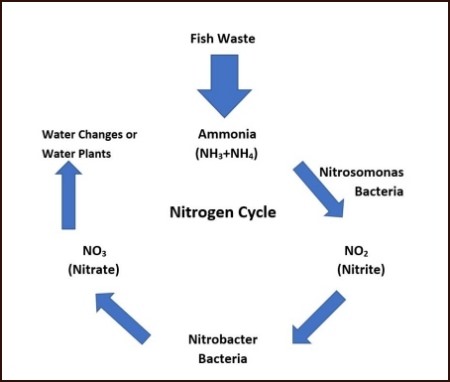| Back to Back Issues Page |
 |
|
The Goldfish Gazette, Issue #055 -- Environmental Poisons July 31, 2018 |
Goldfish Care TipsA Free Monthly Resource For Goldfish Enthusiasts In This Issue
Quoting eminent fish doctor Dr E. L. Johnson, "Perhaps the most important aspect of Goldfish care is the management of water quality". Environmental Poisons Goldfish will put up with poor quality food and cramped conditions, but they can't tolerate poor water quality. Unless you are using a water flushing system to constantly change the water in your Goldfish's environment, most of us take advantage of the Nitrogen Cycle, also known as the ammonia cycle, to manage water quality. Unfortunately the Nitrogen Cycle only works for a certain time, dictated by the bio-load in your aquarium or pond. Many aquarists believe once the Nitrogen Cycle is established, their job is done, no further action is required. Not so. Yes, the Nitrogen Cycle takes out ammonia from the water converting it to nitrites, which are then converted to harmless nitrates, but unless filters are regularly cleaned and water changes made, these environmental poisons will start to build up with devastating results for your fish. Let's examine the three elements of the Nitrogen Cycle to see what effects they have on your fish when at dangerous levels . Ammonia PoisoningAmmonia is caustic to fish skin, fins and gills. Symptoms will include skin redness, excess mucus production, clamped fins, lack of appetite and lethargy.These symptoms are also indications of other diseases, so the danger here is to not test for ammonia assuming the symptoms are of some disease. A well set up and maintained filtration system will seldom have ammonia spikes, but if something changes such as a large fish dies unnoticed, for instance in a large pond, or the helpful neighbors have overfed your fish while you were on holiday, a spike may occur. This is why when you notice something is wrong with your fish, always test the water before doing anything else. In a properly cycled aquarium or pond, the ammonia level should be zero. If you find you have an ammonia problem, find the cause, and do a very large water change. Nitrite PoisoningSimilar to ammonia poisoning, nitrite irritates the skin and gills. Nitrite is also absorbed through the gills and binds with the red blood cells in the fish's bloodstream making them unable to carry oxygen.Fish that have been killed by nitrite poisoning often have widely flared gills upon death. It is unlikely that your filtration system would have moved from an ammonia spike to a nitrite spike without you noticing, but again, the best treatment is a very large water change. A fully cycled aquarium or pond should have a zero nitrite level. Nitrate PoisoningThe last stage of the Nitrogen Cycle where nitrites are converted to harmless nitrates was always seen as the successful completion of the toxic waste removal from an aquarium or pond.Nitrates were considered to have no effect on fish health, even at levels as high as 300 to 400 PPM (parts per million). We now know this isn't true. High nitrate levels can cause the blood vessels in the skin and fins to dilate making the skin look streaky and the fins appear to have varicose veins. The most important effect on fish is suppressing the immune system. Fish in high nitrate levels will be prone to infections and have a lack of appetite. There is evidence high levels of nitrates can cause buoyancy issues. Nitrate levels should be kept below 50 PPM. Because nitrate production is at the end of the Nitrogen Cycle, there is no biological removal of them from the water by bacterial action. The only way nitrates are removed from your Goldfish's environment is by water plants or water changes. To read more about how to set up a new aquarium to avoid an ammonia spike which is a major killer of fish, click here. What's New on the WebsiteThe About-Goldfish.com website is now using the secure HTTPS data transfer protocol. This means all data transferred to and from this website is encrypted.For all our European readers, the site also complies with the new GDPR (General Data Protection Regulation) requirements. You will notice a pop-up at the bottom of the page that warns of cookies being used on the site, and the expanded Privacy Policy gives several Opt-Out options for cookies and Google. Comments? Ideas? Feedback? I'd love to hear from you. Just reply to this e-zine and tell me what you think, or what topics you want covered. Next Month's Topic Holidays and your Goldfishwww.facebook.com/aboutgoldfish |
| Back to Back Issues Page |